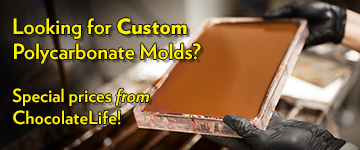Before things go on much further, I want to ask people to take a step back.
The original poster (OP, Sam) asked for input from users of various continuous tempering machines about their experiences. Antonino has done a good job of responding on topic to the question. Sam did not ask for people to offer to sell him used machines and specifically asked that manufacturers or reps get involved in the conversation.
In reading the conversation, it seems clear to me that there are definite misunderstandings about what's being said and some things are being taken too literally - things that are clearly jokes to someone whose first language is English (i.e., the shower reference with respect to what sales people will say to make a sale) are not obvious to someone whose first language is not.
Sam - Antonino makes many legitimate points as someone who works with a specific brand of continuous tempering machine on a daily basis. Preventive maintenance is something that many people overlook. Spending a few minutes once a month checking electrical connections, cleaning things off, covering the electronics board to protect them from dust or chocolate, and checking fluid levels is a real good thing to do on any piece of machinery - especially one you depend on. You do it for your car to extend its life and to reduce the possibility of problems. Doing the same thing for a tempering machine is just a good sense, not an indication that there is something "wrong" with a particular brand of machine. Some cars recommend oil changes every 5000km, others every 8000km, others every 15000km. Some people change the oil every 5000km no matter what the manufacturer says.
Antonino was not entirely clear when he says they all use the same technology. The continuous tempering machines in this class all use basically the sameapproach to crystallization; using temperature and shear force to induce the desired crystal formation. The differences in the machines is in the details about how they implement the approaches as well as fit and finish of materials and construction.
One company may prefer to take a more mechanical approach (as Antonino says it would be easier for him in South Africa to find a replacement temperature probe than it would for him to try to replace a circuit board so he tends to like FBM's machines). But that says a lot about his attitude towards equipment in general. Some people are more natural tinkerers and want to know how something works and know that they can fix things. They feel better and more in control. Some people will never open the hood of their car or change their oil (or add windscreen wiper fluid) - they just don't even want to know how. They will always call in an expert repair tech no matter how trivial the problem is. One is not necessarily better than the other - they are both different approaches.
There is also the case of local pre-sales support and after purchase support. Antonino expressed his experiences with getting that support from South Africa. Those experiences will be different in Italy, Belgium, the US, and elsewhere.
The one thing I will say about this subject is that I am fielding a lot of calls and e-mails from craft chocolate makers who own Selmis who are having problems with them. Specifically, the issue is with chocolate makers who do not add cocoa butter or lecithin to their chocolates. Their experience is that the pump mechanisms in the Semis (Colors and Pluses, can't talk about Tops) are underpowered and they are having problems getting consistent doses out of the measured depositors. I don't know if this is a problem with other makers' machines but it is certainly something I am looking into.
One more comment. While it's nice to have good industrial design, beauty is only skin deep. You need to look inside at the parts that will be doing the actual work. What is the horsepower of the pumps and motors, for example? Ideally, you want something that is over-engineered and that is operating at less than rated capacity rather than something that is always operating at design limits. And that applies to all machinery, not just tempering machines.
--
~~~~~~~~~~~~~~~~~~~~~~~~~~~~~~~~~~~~~~~~~~~~~~
@DiscoverChoc

 ... before leaving this discussion because probably I'm not allowed to answer this, I would like to make you understand that there IS A BIG difference in tempering. There is the tempering with a gas system that is or cold or not cold and a tempering with the water cooling that we apply in our machinery. This system is more expensive because we use a tank with water, we cool this water with a fridge system and we pump around the water in a double jacket around the screw that transports the chocolate. Everybody can visit our company to have a look into this system, our factory is open for visits of our customers and potential customers. We are very open to make the people understand before they invest an important amount of money from their businesses, (Money where people have to work hard for and we understand this very well) If you want to try the machine in the shower before you buy it, you can
... before leaving this discussion because probably I'm not allowed to answer this, I would like to make you understand that there IS A BIG difference in tempering. There is the tempering with a gas system that is or cold or not cold and a tempering with the water cooling that we apply in our machinery. This system is more expensive because we use a tank with water, we cool this water with a fridge system and we pump around the water in a double jacket around the screw that transports the chocolate. Everybody can visit our company to have a look into this system, our factory is open for visits of our customers and potential customers. We are very open to make the people understand before they invest an important amount of money from their businesses, (Money where people have to work hard for and we understand this very well) If you want to try the machine in the shower before you buy it, you can 

Sorry, the price $10,000 quoted by me does not includes enrober or any other accessories. My aim, either to get a machine at around $10,000 or +/-$3000 and get enrober and other accessories later or to buy a machine currently which does not supports enrober and get a 2nd machine with enrober after a year of business establishment.
Looking for opinions of the best machines and best options.